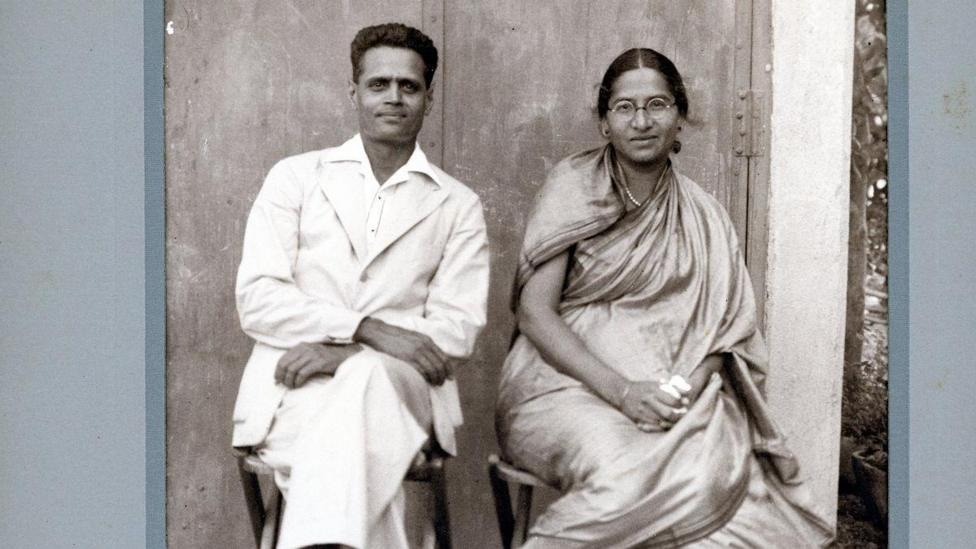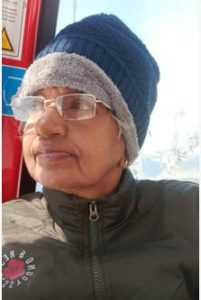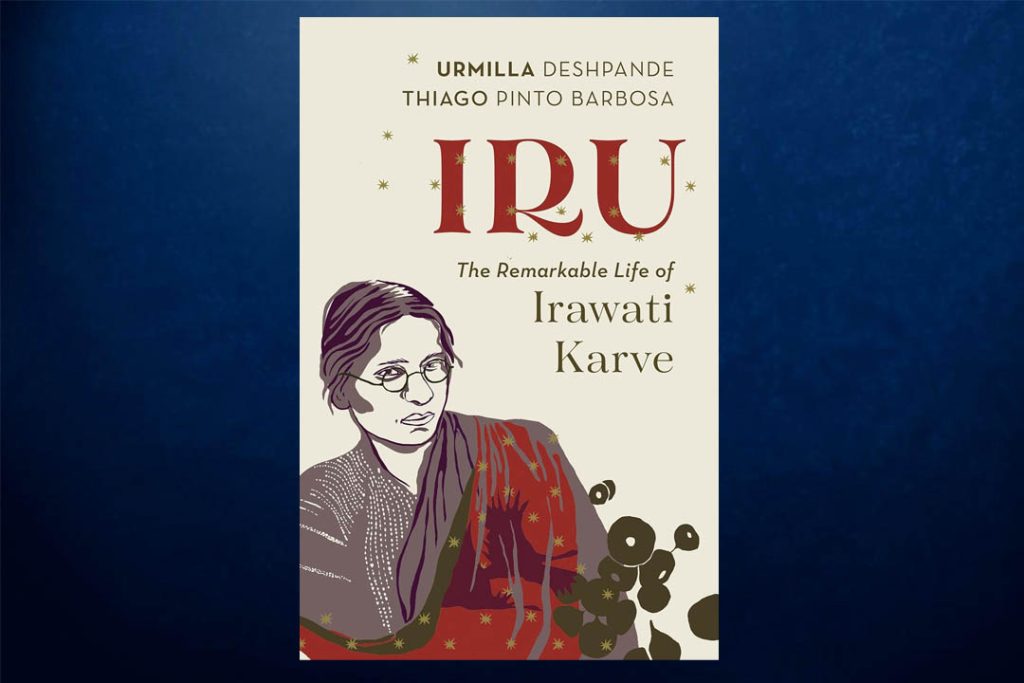Iravati Karve, known in the literary world for her valuable masterwork ‘Yugantha’ a rethinking on the major characters of Mahabharatha, is a mesmerizing character in the intellectual arena because of her astounding knowledge of not only Sociology and Anthropology, but a variety of other subjects too. Her alluring personality has been effectively delineated in her recently published biography. ‘Iru’ written on joint effort by Urmila Deshpande (her granddaughter) and Thiango Pinto Barbosa. The book consists of two parts (16 chapters) giving an authentic account of Irawati Karve’s birth, growth, education, higher studies, career and her literary works.
The Prologue makes a reference to Irawati’s research work in Germany on anthropology. It describes the hurdles she had to face in her study of human skulls with the hypothesis that the European’s skull was bigger than a non European’s. Those were the times of Hitler shouting vociferously about the Aryan Superiority. Irawati had hell of a time proving that it was not so.
The first chapter of Part 1 titled ‘Ausland’ recounts the difficulties Irawati faced during her journey on board a ship from Bombay to Berlin. She was hardly 22 years old without any experience of travelling alone at that time. She felt all alone to spend almost a week until she reached Berlin. She joined Kaiser Wilhelm University as a research scholar and made arrangements for her stay in the hostel. But the feeling of loneliness made her desperate. Her inability to eat non vegetarian food caused another problem.
Irawati observed that the Jews were the neglected lot in Germany. They were not considered Germans by the Aryans. As a result of the Germans’ defeat in the First World War, poverty had squeezed the life of the people turning them almost to be beggars. A large part of the city of Berlin was a bunch of shanty towns filled with slum settlements overcrowded with people of substandard living. Iru felt pained to see that.
Eugene Fischer was Irawati’s research guide. The topic chosen by her was ‘The Chitpawan Brahmins-An Ethnic Study’. Fischer said that some basic knowledge of Anatomy was necessary for it. Therefore Iru joined Anatomy classes. She had classes at the KWI-A building at the Wilhelm University. In winter it used to be dark very early in the evening when it was tea time. She had to reach home before darkness. But an old German lady called OMA arranged for her stay in Berlin and she found it comfortable.
It is in Part 11 of the book that we get to know about Irawati’s birth and growth. She was born in lower Burma (now Myanmar). The river Irawaddy flowed through lower Burma to Rangoon. It was the waterway to Mandalay and she was born there in 1905 as the fifth child and first daughter of Ganesh Hari Karmarkar and Bhagirathi who in fact were Maharashtrians. Burma was under British rule at that time. Ganesh Karmarkar was employed in a company there. Ganesh named his daughter with a very rare name after the river Irawaddy. Lack of facilities for her education at Mandalay made him send her to a Boarding School at Poona when she was 7 years old. However, the girl was not happy in the hostel. It was at the same time that her friend Shakunthala once took her to her home. Shaku’s father R.P. Paranjape, who was the principal of Deccan College and his wife liked Irawati very much and they told her to stay with them thereafter. Later, the bond between them became so strong that they became her second parents. She stayed with them throughout her education. When she completed her graduation, her real father was quite reluctant to send her to go for post graduate studies. But she went to Bombay to do her post graduation in Sociology with the help of R.P. Paranjape.
At Paranjape’s house Irawati met Dhondo Keshava Karve who was a pioneer of women’s liberation, their education and widow remarriage. She was greatly inspired by him, and she joined him in undertaking some social work too. Later she fell in love with his son Dinkar Karve and married him much against the will of her parents. Dinkar had done his Ph.D. in Chemistry in Germany. He encouraged Irawati also to go to Germany to pursue her research work.

Irawati completed her Ph.D. in two years and returned to India. Immediately she joined SNDT Women’s University in Bombay as an administrator and worked there between 1931-36. Later she moved to Deccan College as a Reader in Sociology in 1936 and worked there till the end of her life.
Hamsamukh Dhirajlal Sankalia was Irawati’s colleague. Irawati developed keen interest in spiritual and philosophical ideas by reading ancient Sanskrit texts like Vedas and Upanishads. She took interest not only in Hinduism but in all other religions of the world. She reveled in a feeling of belonging to the world. The feeling of being one with the sunset, with humans, birds and animals. She felt that she belonged to the same substance as they did the substance of the universe.
Irawati studied Vyasa’s Mahabharata from the sociological and anthropological perspective and penned forth her views on the major characters and events of the epic. She does not pass any judgment on the goodness or meanness of the characters but delineates them as responding to the situations they come across. She named her book ‘Yugantha’. It was acclaimed as the best book on Mahabharata and she received the Central Sahitya Akdemi Award for it. It was translated not only into English but all other Indian regional languages. Irawati was the first female anthropologist, a discipline that was synonymous with Sociology at that time. She had a wide-ranging academic interest, including anthropology, Serology, Indology and Paleontology and collecting folk songs and translating feminist poetry.
The biography has been neatly presented in a lucid but eloquent language by the two writers, enabling the readers get a comprehensive picture of enormity of the gigantic personality of Irawati Karve.

Dr. Parvathi G. Aithal
Suraganga, Basrur Cross Road, Kundapura -576201. Mob : 9242253642
Name of the book : IRU-the Remarkable Life of Irawathi Karve
Authors : Urmila Deshpande & Thiago Pinto Barbosa
Publishers : Speaking Tiger Books I.I.P. New Delhi
Publication Year : 2024

